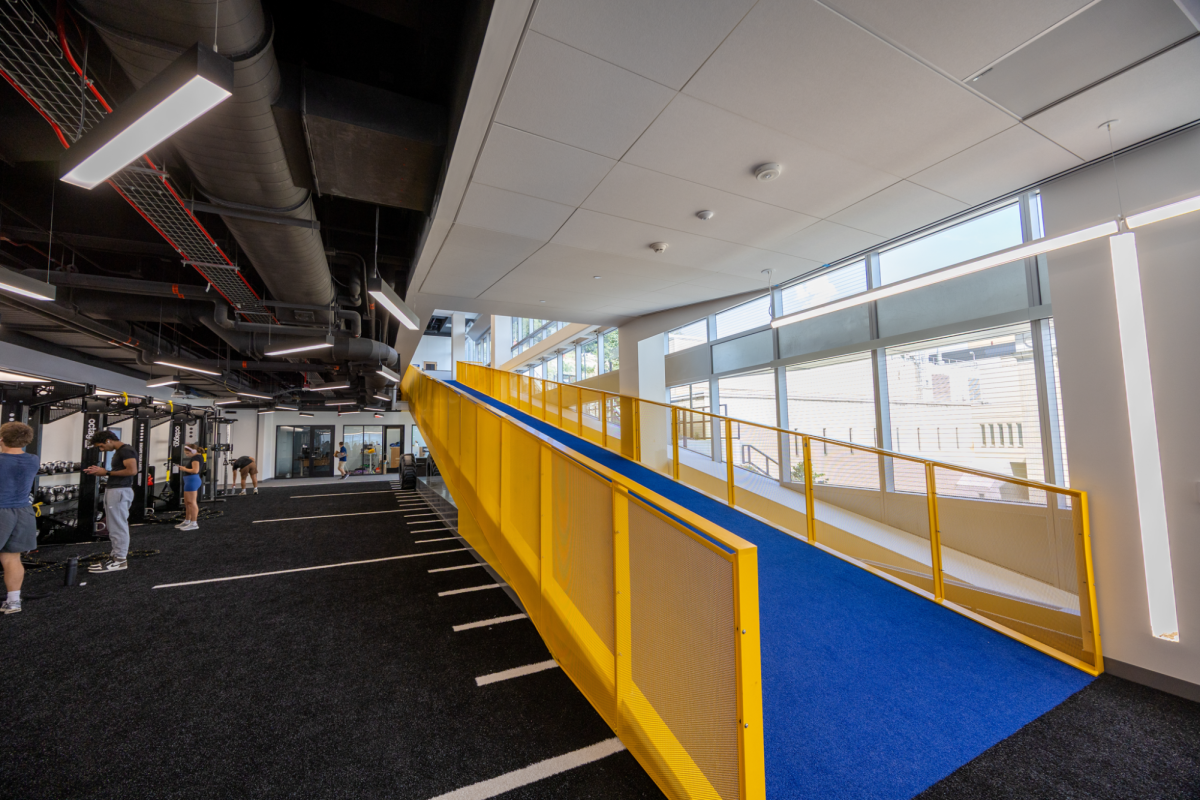Pitt provides numerous resources and accommodations to ensure all students and faculty have access. Despite the resources offered, students with disabilities are facing physical and academic challenges on campus.
2,850 students are currently registered with the University Office of Disability Resources and Services, with more than 9,000 individual accommodations arranged so far this semester. DRS recently experienced a jump in students seeking disability accommodations, reporting an increase from 3-5% to 10% in 2023-2024.
Inconvenient paths to class and disregard for mandated accommodations are among accessibility issues students face, according to Kaden Herchenroether, a senior sociology major and a wheelchair user.
“[In] the Cathedral of Learning, there [are] limited pathways you can take to get in. I have to add that extra time for the elevators because there’s certain shortcuts I can’t take,” Herchenroether said.
Due to unreliability Herchenroether said she faces with the disability shuttles, she can’t get around campus as much as she hoped.
“I thought with the shuttles and everything, there would be more opportunities for me to go back and forth,” Herchenroether said. “But when the shuttles don’t come, you have to fend for yourself.”
University spokesperson Jared Stonesifer emphasized the efficacy of the shuttles.
“In addition to Pitt’s fleet of wheelchair-accessible shuttles that operate throughout campus, the Disability Shuttle provides transportation for eligible students, faculty and staff with temporary injuries and permanent disabilities,” Stonesifer said.
Stonesifer acknowledged the challenging local landscape and said the University is constantly working to improve campus accessibility.
“Pittsburgh is an older city with unique terrain and is well-known for steep hills that pose challenges,” Stonesifer said. “The University works daily to update older buildings with accessibility improvements that mitigate these challenges, and designs its new buildings fully accessible to serve all Pitt community members.”
Pitt has made efforts to make campus more accessible to students, including disability shuttles and accessible entrances to all Pitt buildings. Despite these efforts, however, the hilly landscape of Oakland makes it challenging for students with disabilities to get around, according to Herchenroether.
“Trekking up Cardiac Hill as a wheelchair user is virtually impossible, especially in snowy and rainy conditions,” Herchenroether said.
In addition to physical issues, Hercheroether said she faces some academic challenges due to disability accommodations.
“It’s pretty rare that [professors] won’t be understanding, [but] I had to drop a class because I had one teacher and she was not accommodating,” Herchenroether said.
Herchenroether said she has never had longstanding issues with accommodations being fulfilled, but feels that past requests were handled in “an inhumane way.”
In the spring of 2024, Herchenroether needed a table for a classroom of hers that did not have any seating to accommodate her wheelchair.
“They fulfilled my request for the table, but the way they set it up was [that] you enter the lecture hall, [and] they put the table right there so no one could get in or around me. I was like, ‘This is just making me a burden,’” Herchenroether said.
Jessie Male, assistant professor of disability studies, acknowledged the strides Pitt has taken to be more accessible.
“Pitt seems to have prioritized accessibility in a variety of ways that I definitely want to acknowledge — they have increased the role of the DRS, there have been moves to make the websites accessible, [and] I’m teaching now in an accessible classroom,” Male said.
Male said she feels that more open dialogue surrounding increasing accommodations would be beneficial.
“The first thing [to increase accessibility] is talk to students,” Male said. “Oftentimes, administration and students are kind of put in opposition to each other, and part of access has to be collaboration.”
Herchenroether agreed, adding that she wants new perspectives included in University leadership when discussing accommodations at a higher level.
“I would like to see a disabled figurehead or advocate in Pitt staff or in DRS. I think it would be really beneficial to have a disabled member of Pitt staff that would understand what it’s like not having accessibility and certain accommodations,” Herchenroether said “There’s a disconnect between us and the able-bodied staff, because it’s not something they ever think about — because they don’t have to.”
Male said she has noticed some recent improvements, such as more visually accessible signs near classrooms. According to Male, something as “simple as signage” is an essential step in the process to make actual information more attainable.
“They’re starting to add larger numbers outside the classrooms in the Cathedral of Learning,” Male said. “Access is rooted in the idea of information, in addition to concrete resources.”
Hechenroether said she wants to feel more a part of student life and hopes that disabled students at Pitt can come together to support one another.
“I feel like there’s not many opportunities that you can do as a disabled person, and I think it would just be beneficial to maybe have something. I would just love to have a disabled population, especially for physically disabled people, that I could turn to,” Herchenroether said
Beyond a community of disabled students, Herchenroether thinks that one day, access can achieve a point where people “don’t have to bat an eye.”
“Accessibility means it’s not just a space that can be operated by and for disabled people or people with mobility devices, but for everyone,” Herchenroether said. “I would just love to be more integrated.”
Male agreed that access needs to go “beyond a sense of legality.”
“True access is a form of care, because it’s so significant that we are not only focused on what is making us comfortable in the spaces that we inhabit, but other people as well,” Male said.

